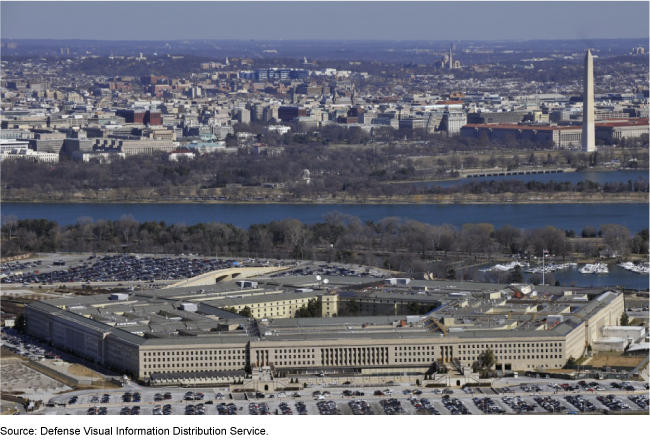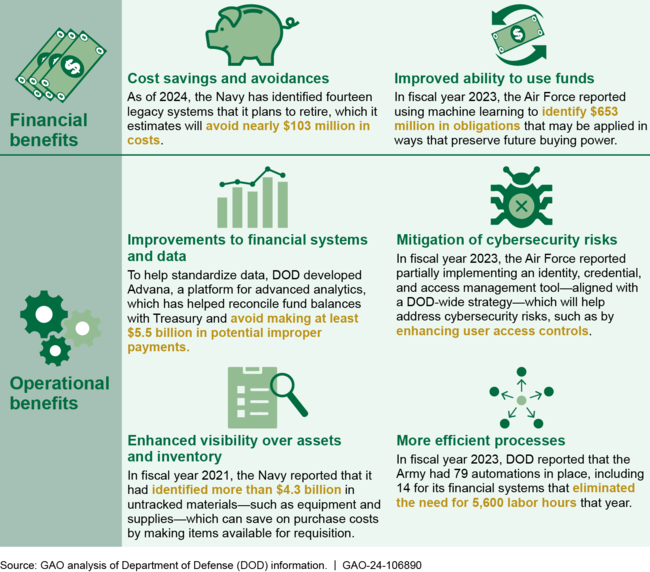Financial Management: DOD Has Identified Benefits of Financial Statement Audits and Could Expand Its Monitoring
Fast Facts
DOD continues to work toward its goal of achieving a "clean" audit opinion—when its financial statements are presented fairly and in accordance with accounting principles.
The financial statement audit process also finds problems that can be fixed—which has value far beyond the audit opinion. As a result of the audit process, DOD has seen cost savings, better asset management, increased efficiency, and more.
While DOD tracks some of these outcomes, it could do more. For example, it doesn't collect information on outcomes from all of its components.
Our recommendation addresses this to make the audit process even more useful department-wide.

Highlights
What GAO Found
Department of Defense (DOD) financial statement audits have resulted in a range of financial and operational outcomes, and additional outcomes are anticipated. According to DOD information, DOD's audit remediation efforts have resulted in financial benefits, including cost savings and avoidances, and improved ability to use funds. GAO also found that DOD's efforts have resulted in operational benefits, including improvements to financial systems and data, mitigation of cybersecurity risks, enhanced visibility over assets and inventory, and more efficient processes (see figure).
Examples of Financial and Operational Benefits of DOD Financial Statement Audits

DOD has taken some steps to collect examples of outcomes resulting from the financial statement audit, but these efforts are limited. For example, since 2019 DOD has conducted data calls to identify audit outcomes, but the data calls request three to five positive outcomes from only selected DOD components and do not collect negative or neutral outcomes. DOD also has not considered all opportunities—such as use of an existing database field—to expand its information collection efforts. By considering opportunities to collect additional information on audit outcomes, DOD could enhance its ability to determine the effectiveness of its corrective actions and share lessons learned across the department.
Why GAO Did This Study
DOD is responsible for about half of the federal government's discretionary spending. Since fiscal year 2018, DOD has undergone annual full, department-wide financial statement audits, as required by law. While DOD remains the only major federal agency that has never been able to achieve a clean audit opinion, it has made progress toward this goal. In fiscal year 2023, 10 of 29 DOD components or funds received a clean audit opinion, including the Marine Corps, which received a clean audit opinion for the first time. The financial statement audit has value beyond the audit opinion, helping DOD save money, improve inventory management, and provide better data for decision-making.
This report examines (1) financial and operational outcomes that have resulted or are anticipated to result from DOD's financial statement audits and related remediation efforts, and (2) the extent to which DOD has taken steps to identify outcomes of its financial statement audits and related remediation efforts.
GAO reviewed DOD publications and other documentation; interviewed DOD, Inspector General, and independent public accounting firm officials; analyzed the results of DOD data calls from fiscal years 2019–2023; and performed case studies of selected audit outcomes.
Recommendations
GAO recommends DOD consider opportunities to collect and share additional information on financial and operational outcomes and lessons learned resulting from audit remediation efforts. DOD concurred with GAO's recommendation.
Recommendations for Executive Action
| Agency Affected | Recommendation | Status |
|---|---|---|
| Department of Defense | The Secretary of Defense should ensure that the Under Secretary of Defense (Comptroller) considers opportunities to collect and share additional information on financial and operational outcomes and lessons learned resulting from audit remediation efforts. (Recommendation 1) |
DOD concurred with this recommendation, and in March 2025 provided us with its corrective action plan to address the recommendation. The plan states that DOD will review its current processes and consider opportunities to enhance its collection of financial and operational outcomes related to the financial statement audit. According to DOD, considerations will include potential data call improvements to expand the scope of reported audit outcomes and improve linkage of audit outcomes to scope-limiting material weaknesses. As of March 2025, DOD estimated these actions will be completed by December 2025. We will update the status of this recommendation as more information becomes available.
|
